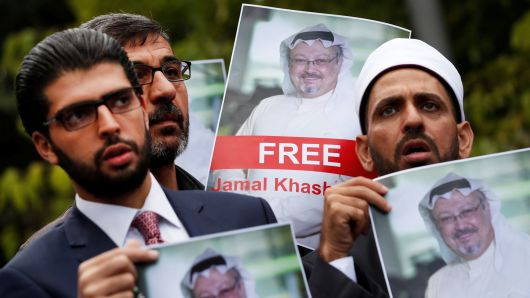Khashoggi's Assassination: Political Fallout

The alleged murder of Saudi dissident journalist, Jamal Khashoggi, at the Saudi consulate in Turkey has already delivered a powerful blow to the Saudi government's image and prestige in the international community, in light of the growing boycott of an upcoming Saudi investment conference by various US and European companies and a parallel pressure on the Trump administration to consider imposing sanctions on Riyadh pursuant to the US's Human Rights Accountability Act also known as Global Magnitsky Act of 2016.
So far, President Trump has maintained a muted response that has become increasingly untenable, with aspects of US media accusing him of prioritizing his family's business ties with the Saudi royal family and thus portraying him as being on the wrong side of "the moral divide." As expected, Trump's advisers including national security adviser John Bolton and Secretary of State Mike Pompeo are also quiet, perhaps reeling that their hostile Iran agenda is now negatively impacted by the political earthquake surrounding Khashoggi, by virtue of the simple fact that the US Congress and media are now focusing on Saudi Arabia and not Iran in what appears to be an enduring story.
Thus, barring an unexpected development, such as the resignation of the harsh Saudi Crown Prince accused of having Khashoggi's blood on his hand, Saudi-bashing will have the upper hands in the US media and politics for some time, raising questions about Trump's Iran and the Middle East policies. Indeed, this follows a recent spate of setbacks for the bellicose Iran policy, including the pro-Iran interim verdict at the Hague Court, the US's missteps at the UN, the progress on the Iran deal between Iran and other signatories of the deal minus US, and the resignation of the ardently anti-Iran US envoy to UN, Nikki Haley, whose departure has been widely welcomed in the international community. Indirectly, Khashoggi's cold-blooded murder hampers the behind the scene efforts of Bolton to replace Haley with one of his own stooges in preparation for a war with Iran.
A big question is, of course, about the war in Yemen, where according to the UN reports, millions are starving and there is a dire need for much greater humanitarian assistance immediately. The Saudi-UAE carnage after more than three years continues to go nowhere and the Houthi-controlled government in Yemen is entrenched and successfully defending itself. The Khashoggi scandal now makes it harder for the Saudis to continue their murderous policy, which has so far had the unconditional backing of Western governments led by US and England. The latter are now forced to rethink their unwise policy of writing a blank check to the ruthless Crown Prince, whose intelligence operatives are said to have carried Khashoggi's dismembered body back to him in cake boxes, i.e., a present with prohibitively high price to pay with billions of dollars of suspended foreign investment and a much tarnished international image that will harm the government's domestic and foreign agenda for months to come. Castigated as brutal human rights abusers, the Saudi leaders are now forced in the uncomfortable position of pondering their alternatives, with time running out on them.
For Iran's part, Tehran must join the international community demanding answers about the fate of Khashoggi and joining the chorus of world leaders condemning his murder. A UN Security Council action is also needed, which must be supported by Iran and other countries concerned about the on-going Saudi atrocities. The UN Secretary General has so far kept the valued Saudi relations close to his heart yet Mr. Guterres may now need to boldly criticize the Saudi leadership and send a strong message that business as usual with the Crown Prince still in charge is now impossible. A similar message may soon be sent by Washington, if the heat on Trump to act continues to build up, which indirectly benefits a de-escalation of tensions between Tehran and Washington. It is therefore incumbent on Iran to not give the Saudis and their hawkish supporters in Washington any excuse to divert attention from their atrocities. Rather, Iran must take additional steps to assure the outside world of its deep respect for human rights and the rights of political dissidents. The tremors of Khashoggi earthquake also rattle the UAE, which must now think twice about its complicity in the Yemen war. Hopefully, Khashoggi's message on the need to end the Yemen conflict, reflected in his latest writings, will now receive much greater attention in UAE and other Arab sheikhdoms of Persian Gulf who need to revise and re-track their approach toward Iran, Yemen, and indeed the entire region.

